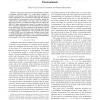Free Online Productivity Tools
i2Speak
i2Symbol
i2OCR
iTex2Img
iWeb2Print
iWeb2Shot
i2Type
iPdf2Split
iPdf2Merge
i2Bopomofo
i2Arabic
i2Style
i2Image
i2PDF
iLatex2Rtf
Sci2ools
122
click to vote
ICRA
2008
IEEE
2008
IEEE
Rigorously Bayesian range finder sensor model for dynamic environments
— This paper proposes and experimentally validates a Bayesian network model of a range finder adapted to dynamic environments. The modeling rigorously explains all model assumptions and parameters, improving the physical interpretation of all parameters and the intuition behind the model choices. With respect to the state of the art model [1], this paper proposes: (i) a different functional form for the probability of range measurements caused by unexpected objects, (ii) an intuitive explanation for the discontinuity encountered in the cited paper, and (iii) a reduction in the number of model parameters, while maintaining the same representational power for experimentally obtained data. The proposed beam model is called RBBM, short for Rigorously Bayesian Beam Model. A maximum-likelihood estimation and a variational Bayesian estimation algorithm (both based on expectation-maximization) are proposed to learn the model parameters.
| Added | 30 May 2010 |
| Updated | 30 May 2010 |
| Type | Conference |
| Year | 2008 |
| Where | ICRA |
| Authors | Tinne De Laet, Joris De Schutter, Herman Bruyninckx |
Comments (0)

